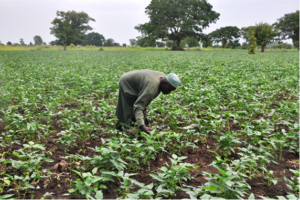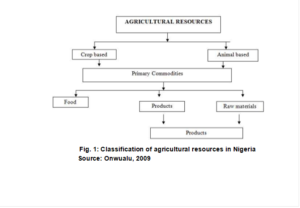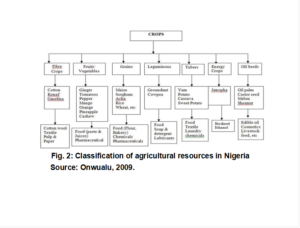Publication Information
Frequency: Continuous
Format: PDF and HTML
Versions: Online (Open Access)
Year first Published: 2019
Language: English
| Journal Menu |
| Editorial Board |
| Reviewer Board |
| Articles |
| Open Access |
| Special Issue Proposals |
| Guidelines for Authors |
| Guidelines for Editors |
| Guidelines for Reviewers |
| Membership |
| Fee and Guidelines |
 |
Enhancing Food Production through Climate Resilient-Smart Agriculture for Sustainable Development in Nigeria
Wilfred Ifeanyi OKONKWO1,3*, Onyekwere Ojike1,3, Benjamin Anabaraonye2, Emeka. W. Okafor3, and Emmanuel O. Kolawole3
1World Bank African Centre of Excellence for Sustainable Power and Energy Development, University of Nigeria, Nsukka
2Institutue of Climate Change Studies, Energy and Environment, University of Nigeria, Nsukka
3Department of Agricultural and Bioresources Engineering
University of Nigeria, Nsukka
Received Date: July 17, 2024; Accepted Date: July 31, 2024; Published Date: September 21, 2024;
*Corresponding author: Wilfred Ifeanyi OKONKWO, 1World Bank African Centre of Excellence for Sustainable Power and Energy Development, University of Nigeria, Nsukka; Email: Wilfred.okonkwo@unn.edu.ng; Phone: +2348033264401
Citation: OKONKWO WI, Ojike O, Anabaraonye B, Okafor EW, Kolawole EO (2024) Enhancing Food Production Through Climate Resilience Smart Agriculture for Sustainable Development in Nigeria. Adv Agri Horti and Ento: AAHE-209.
DOI: 10.37722/AAHAE.2024304
Abstract

Climate change is perhaps the most serious environmental threat to humanity and the global food web. The impacts of climate change are manifest in hunger, low agricultural productivity, poverty, undernnourishment and high soaring prices of food stuff that are presently ravaging the entire land. The challenges of changing weather, rainfall variability, increasing temperature rise, drought, deforestation and low productivity underscores the need for this paper. Nigeria’s farming community consists 70% of the entire population, out of which 88.4% constitutes subsistence and 11.6% are the medium to large scale framing which produce about 70% of the food consumed by over 200 million Nigerians. Solution to ameliorating the increasing impacts of climate change should be individual-government-private sector driven. Therefore, in the face of exploding population and increasing impacts of climate change, climate resilience smart agriculture has major key role to play. Benefits of smart agriculture include improved food production, use of modern equipment to enhance food production, growing climate change resistant crops and seedlings, enhanced environment etc. Government programmes should be tailored towards achieving active participation of everyone, funding of agricultural research, empowerment of local farm holders, capacity building, drought resistant and short duration high yielding crop development, integration of indigenous and modern knowledge on climate change adaptation, strengthening of extension services and encouragement of the formation of farmers groups. The paper discuses measures and ways to enhance food production through climate resilience smart agriculture in Nigeria. It highlights key impacts of climate change on Nigeria agricultural development. It provides policy recommendations that could help to address these challenges for sufficient food production.
Introduction
Our forefathers were able to feed the population then because all were involved in agriculture both the father, mother and the children. But things have really changed. Since the advent of white-collar job only very few individuals are involved in agricultural production. Even in the face of population explosion not many would want to be involved in agriculture yet all would want to eat the best food whatsoever. Majority of people that read agriculture and related disciplines won’t want to be associated or involved in agriculture. The effect is the soaring rise in food prices and general hardship. Population is outgrowing the rate of food production.
Agriculture as a vital sector in the Nigeria economy contributes approximately 23% of the country’s GDP. The country has 70.8 million hectares of land area with rich agricultural sector base. Agriculture employs about 70% of the labour force. However, the major farming work are done by small farm holders who constitute 88.4% of the total while 11.6% are involved in medium to large scale production. Nigerian’s food import bill is on the increase and therefore a concern for the development of the economy. Factors like inadequate infrastructure, poor land tenure systems, low levels of irrigation application, land degradation, low technology, high production cost and poor distribution of inputs, limited financing, high post-harvest losses and poor access to markets and insecurity have been identified as challenges that contribute to the decline in food productivity. Climate change exacerbates existing challenges, including low agricultural productivity and inadequate technology adoption. Reduced rainfall, shorter growing seasons, and rising temperatures threaten agricultural output, with some crops potentially facing yield reductions of up to 25 percent by 2050.
Climate change is a reality and the global impact is felt everywhere. Rivers and streams are drying up, lands are being degraded due to deforestation, desertification and erosion, temperature rise and rainfall variability and the rising cost of living. These are the signs that the weather is changing and the global Eco-system is being distorted and no longer in equilibrium. It is evident that early agriculture was practiced smart and therefore sustainable in an Eco-balanced environment when temperature, rainfall and forest were undisturbed and were in equilibrium and everything were normal. Organic and sustainable agriculture were invoked while bushes were allowed to mature before being used again. Inter cropping and crop rotation sustained food production. But today with the improved agrochemical, technologies and improved seedlings feeding the population has become a difficulty task. With the increasing population, one would have thought that more hands would have been in agricultural production as there would be more food products available for the people.
The rise in food prices in Nigeria, is partly due to global factors resulting from climate change, as the country imports some food to supplement local production.
Food Consumption and The Population
Nigeria, the Africa’s biggest economy relies heavily on importation for many goods consumed in the country, including food. This is not healthy for the development of the economy. Nigeria’s food import bill has been on the rise in recent years. According to THISDAY 5th June, 2024 despite being touted as the food basket of Africa, Nigeria has spent over N7.8 trillion in the past six years on food import alone while a report by the Central Bank of Nigeria (CBN), states that Nigeria’s food import bill jumped by 45 per cent to $2.71 billion (N1.12tn) in 12 months. Nigeria exports and imports of goods and services as percentage of GDP stood at 10.74% and 11.84% respectively. The average agricultural output growth between 2011 – 2020 was 3.5% against the backdrop of about 2.6% population growth rate.
This is a clear demonstration that the rate of population growth outweighs the rate at which food is produced. This accounts for the present-day food insecurity, hunger, and malnutrition in the land. Nigeria has over 200 million people while it’s projected population by 2050 is about 400 million people. This is a clear indication that something more urgent need to be done if the objective of the government is to eradicate hunger by 2030 as stipulated by the United Nations Sustainable Development Goals (SDGs).
Government Initiatives Programmes
Addressing the challenges, the Government has initiated and implemented several programmes in order to address the food situation in the country. Nigeria has a rich agricultural heritage, and efforts to boost local production to reduce the dependence on food imports has been initiated. The initiatives include the Agriculture Promotion Policy (APP), Nigeria–Africa Trade and Investment Promotion Programme, Presidential Economic Diversification Initiative, Economic and Export Promotion Incentives and the Zero Reject Initiative, Reducing Emission from Deforestation and Forest Degradation (REDD+); Nigeria Erosion and Watershed Management Project (NEWMAP); Action Against Desertification (AAD) Programme, Anchor Borrowers Programme. The major aims of these programmes were to empower farmers with funds and essential inputs to boost agricultural productivity. And also provide sufficient food for domestic consumption and commodity crops for export markets as well as promoting sustainable management of agricultural resources and mitigation of vulnerability.
Nigeria’s Agricultural Resources Potential
Nigerian agricultural resources are classified into two – crop and animal (Fig 1) resources. Each of these categories can be converted to food and raw materials for different industrial applications and products at different levels as seen in Fig. 2.

The crop resource can be broadly classified into cash and food crops. These include oil seeds – groundnut, oil palm and palm kernel; cereals – rice, maize; root crops and tubers – cassava, potato, yam; economic tree crops – rubber, cocoa, coffee, tea, neem; fruits trees crops –cashew, mango, orange banana, pineapple; legumes and vegetables, mushroom, etc. (Fig. 2).

Impacts of Climate on Food Production in Nigeriae
Climate has great influence on agricultural productivity in Nigeria. Over 80% subsistence farming in Nigeria is largely rain-fed. Farmers in Nigeria reported that climate change is causing uncertainty in the length and onset of the farming season, longer and shorter periods of rainfall, and reduced harmattan (a dust-laden wind with very humidity on the Atlantic coast of Africa)
Climate change negatively impacts on crop and animal productivity by decreasing crop yield and soil fertility, limiting the availability of soil water, increasing soil erosion and desertification, increasing heat stress on animal production as well as contributing to the spread of pests. Decline in crop and animal production due to climate change is further exasperated by lack of access to farming technology that reduces over-reliance on the rain-fed farming system and subsistence agriculture. Because of negative impacts of climate change many people especially the young ones have abandoned agriculture as a carer job. Many find better option in transportation jobs like motor cycling and triple cycle riding (okada and keke ridings, etc.) while many left farming for city jobs such as security, hotel attendants, housekeepers etc. There is need for initiatives that could motivate the young ones and older farmers through access to credits, irrigation facilities, and innovative climate change adaptive strategies. Unless something urgent is done climate change will continue to has significant negative impacts on the Nigeria socio-economic setup and agricultural productivity. Rainfall variability is projected to continue to increase in Nigeria while precipitation in the south is expected to rise, exacerbating the risk of flooding and submersion of coastal cities and farm lands. Droughts in the Northern part is rising due to decreasing precipitation and the continued temperature rising. All these threatens agricultural productivity and need to be addressed as the population explodes.
Food Import and Export in Nigeria
The challenges arising from climate change have stifled food productivity thereby affecting the agricultural sector’s contribution to the country’s GDP. Increasing food imports due to the increasing population rise and climate change impacts on food security and agricultural productivity in Nigeria. Between 2016 and 2019 Nigeria’s cumulative agricultural imports stood at N3.35 trillion, four times higher than the agricultural export of N803 billion within the same period. The National Bureau of Statistics (NBS) and the Centre Bank of Nigeria reported that the total agricultural imports into Nigeria from 2018 to 2022 amount to N6.916 trillion while total agricultural exports from the country within the period was N1.997 trillion, resulting in an agricultural trade deficit of N4.919 trillion.
Weather and time are changing and as such our method of food production should change to meet up with the growing population and changing time. The impacts of climate change on food and agricultural productivity are clear indications of poverty and hunger on the land, and a need to institute intensified sustainable agricultural development for eradicating hunger by 2030 as stipulated by the United Nations Sustainable Development Goals (SDGs).
Climate Smart Agriculture
Smart agriculture is the adoption of advanced technologies and data-driven farm operations to optimize and improve sustainability in agricultural production. The technologies used for smart farming include artificial intelligence (AI), automation, sensors, location systems, robots and the Internet of Things (IoT). Smart agriculture is a modern farming method that delivers positive outcomes through intensification, adaptation and mitigation that support food production under the realities of climate change. The outcomes are timely intervention, specific applications and measurable outputs which are attainable and very realistic.
Importance of CAS in Boosting Food Production for Sustainable Development in Nigeria
Climate Smart Agriculture (CSA) is built on the existing agricultural knowledge, technologies, and sustainable principles. The introduction to local farm holders is based on location and crop specifics. Farmers will likely understand and see it as improvement on what they already know. Its distinctness are:
- It has an explicit focus on addressing climate change in the agricultural food web
- CSA systematically considers the synergies and trade-offs that exist between productivity, adaptation, and mitigation and
- CSA encompasses a range of practices and technologies that are tailored to specific agricultural ecological situations and socioeconomic context including the adoption of climate resilience crop varieties, agroforestry, precision farming, improved livestock management, water management strategies and conservation agriculture techniques.
Benefits of CSA Implementation
Implementation of CSA practices lead to triple win achievements.
- Enhanced productivity: More and higher quality food will be produced without putting an additional strain on natural resources. It improves nutrition security and boost incomes of farmers, especially for 75% of the world poor who live in rural areas and mainly rely on agriculture for their livelihood.
- Enhance resilience: CSA reduces vulnerability to droughts pests, diseases and other climate risks and shocks, and improves the capacity to adapt and grow in the face of longer-term stresses like increased seasonal variability and more erratic weather patterns.
- Reduce emissions: By its implementation it reduces greenhouse gas emissions of food systems, avoids deforestation due to cropland expansion, and increases carbon sequestration of plants and soils.
- Funding for CSA needs to be increased to align available finance with the relevance of the sector. Despite causing one third of global greenhouse gas emission. Agrifood systems receive 4% of climate finance, with only fifth of this going to smallholders. Current financial flows need to be realigned in order to support a sustainable agrifood system transformation.
Way Forward for Climate Resilience Agriculture for Sustainable Development
Farmers are finding it hard to plan and manage production due to changing crop patterns. Therefore, to help the farm holders achieve the objectives of sufficient food production for sustainable development in Nigeria the under listed items are important.
Commercial Agriculture for Smallholder Farming and Agribusiness
In Nigeria, over 80% of smallholder farmers form bulk of agricultural farm holders. Formation of Commercial Agriculture for Smallholder and Agribusiness (CASA) through development partners and introduction of climate smart agriculture (CSA) practices will help transform Nigeria’s agricultural food production systems to green agriculture and sustainable resilient practices with project right interventions. To mainstream climate change adoption measures at small farm holders’ level the employment of the services of Technical Assistants is very imperative. Their work is an important pathway for climate change outreach to farmers all the year-round, providing farmers timely advisory services and imparting knowledge to the farmers on Nursery Management, Integrated Pest Management and introduction of new variety of disease resistant seeds and climate farming technologies. Demonstration farms should be built at zonal levels to acquaint and educate farmers on the new technologies and farming practices. CASA will help small farm holders’ transits from traditional farming technologies into a more climate-smart agriculture.
Precondition for Adoption of Agricultural Adaptation Measures
Farmers perception that the climate is changing and their farm yields are adversely affected is a precondition for the adoption of new agricultural adaptation measures for sustainable and improved yield. Farmers largely endorse adaptation action focused on preparing for more extreme weather events. Adaption action is possible only when farmers perceive climate change as a threat.
Right climate-friendly technologies and practices for enhanced food production
Finding the right climate friendly technologies and practices is a major factor towards enhanced and improved food production. Every farm is unique on its own and there is no one-size fits or methods while there are many climate-smart technologies available for improved yield. For instance, farmers will like to install drip irrigation system that provides their farm with ample supply of water, save time and the same time conserve resources for them. For enhanced and improved product quality technologies should be tailored towards specific needs of the location and the plot of land to produce the best result.
Demonstration Farm Crucial for Enhanced Food Production
Climate smart agricultural practice as a technology is new to many farm holders. Demo-plots are one of the most common features of agricultural extension and are important tools for enabling farmers to learn first-hand knowledge about improved agricultural production practices.
Well-organized demonstration plots contribute to the dissemination of information that simulates farmers to adopt new innovative ideas and practices to improve the quality of produce and increase farm output and income. Farmers want foolproof technologies to be convinced. Conducting demo plots also helps to intensify the impact of training and stimulate interest and credibility. Farmers want a demo where they can witness the new technologies in action and get to observe the increase in productivity before they start adopting. “Some even doubt the technology until the produce is harvested and they get to see for themselves the changes. Farmers want ‘foolproof’ technologies.
Conclusion
For enhanced food productivity and sustainability in agricultural development, government should encourage funding of more research into indigenous local food crops and livestock adaptation to local climatic conditions. This will help to align the available financial resources with relevance to the agricultural sector. Presently, indigenous food crops like maize, millet and beans etc are disappearing and farmers are likely to face starvation of right resilient seeds for planting if nothing is done now urgently. Already many indigenous crops have been potentially facing yield reduction by 25% by the year 2050 while some animals may go into extinction. These call for more research towards the preservation of the indigenous crops and livestock for sustainability and socioeconomic development. Small farm holders that produce the bulk of the food supplies should be encouraged and supported by making more finance and incentives available to them to practice CSA. Food production should be the business of all since food consumption has no cultural or religious barriers. More efforts should be geared towards indigenous local seeds preservation and research for resilient crops and animals sustainability.
References
- Ifeanyi W Okonkwo, Benjamin Anabaraonye, Ijeoma E Orji, Nzemeka C Olisah and Beatrice O Ewa (2023). The role of agripreneurship in enhancing climate resilience for sustainable economic growth in Nigeria, Journal of Environmental Sciences and Agricultural Research pp. 1 – 6.
- https://www.researchgate.net/publication/377299996_The_Role_of_Agripreneurship_in_Enhancing_Climate_Resilience_for_Sustainable_Economic_Growth_in_Nigeria#fullTextFileContent
- IPCC – Intergovernmental Panel on Climate Change Climate Change 2007: The Physical Science Basis. Cambridge University Press; c2007.16. IPCC – Intergovernmental Panel on Climate Change. Climate Change 2007: Impacts, Adaptation and Vulnerability. Working Group II Contribution to the Fourth Assessment Report. Cambridge University Press; c2007.
(7) (PDF) The impacts of climate change on sustainable economic growth in Nigeria. Available from: https://www.researchgate.net/publication/380752792_The_impacts_of_climate_change_on_sustainable_economic_growth_in_Nigeria [accessed Jul 13 2024]. - Isaiah Gabriel, Frank Olajuwon, Mominik Klauser, Blessing Michael and Mara Renn (2023). State of Climate Smart Agriculture (CSA) Practices in the North Central and Northwest Zones Nigeria, CABI Agricultural and Bioscience Vol.33.
- Kolawole Emmanuel and Okonkwo W. I. (2022). Impacts of Climate Change on Environment and the Remedies, International Journal of Weather, Climate Change and Conservation Research, 8 (2), pp 1 – 9. https://www.eajournals.org/
- Okonkwo W. I, Anabaraonye B. N. and damzi T. C, (2023). Sustainable Poultry Production: The Role of Solar Energy in Climate Change Mitigation in Poultry Production, In press (Elsevier).
- Onwualu A. P. (2009). Development of raw materials for wealth creation in Nigeria, paper presented at the 3rd Forum of the Laureates of the Nigerian National Order of Merit (NNOM) Merit House Complex, Abuja, December 1 – 2, 2009.